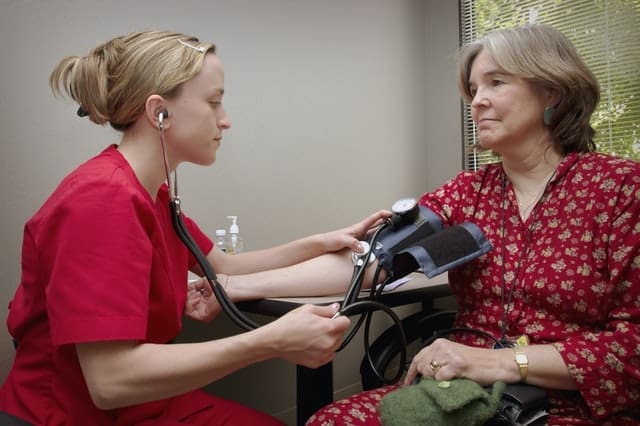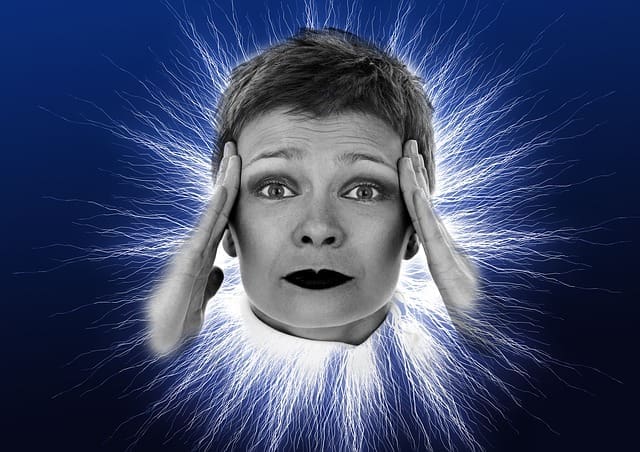Many women get high blood pressure and headaches during their cycles. These headaches can be debilitating and disrupt daily life.
Period headaches can be moderate, and they’re often accompanied by irritation and painful breasts due to changes in blood flow. A person may be suffering from premenstrual syndrome (PMS) in this scenario.
In persons who suffer from migraines, menstruation can also be a trigger. A menstrual migraine headache can occur before, during, or after a period.
This article will discuss how periods can induce headaches, the differences between PMS and migraine headaches, and when to seek medical help.
How do Periods Relate to Your Headaches and High Blood Pressure?
The female body’s hormones rise and fall during a menstrual cycle in preparation for pregnancy.
A typical cycle lasts between 25 and 30 days and lasts from the beginning of one period to the next.
Hormones including estrogen and progesterone assist in regulating the menstrual cycle, and their levels can influence the severity and frequency of headaches.
Acute migraine headaches and elevated blood pressure, for example, can occur when estrogen levels in the body drop dramatically, according to a 2014 review.
Causes and Symptoms
Hormones control the body’s pain response; hence, they are in headaches.
As estrogen and progesterone levels change, females become more susceptible to headaches.
PMS or menstrual migraine are two conditions that can cause headaches around a woman’s cycle.
Menstrual Migraines
A menstrual migraine headache usually strikes just before, during, or after a period. Ovulation might also cause these problems.
Menstruation is a cause for migraine headaches by about 60% of female migraine sufferers.
The symptoms may be comparable to those of migraine headaches, while sensory problems may not be present in migraines that occur close to a period.
Auras, such as flashing lights or blind patches in the field of vision, or a tingling feeling in the hands or face, might occur before a menstrual migraine headache in some people.
Other signs and symptoms of a menstrual migraine headache are:
- Sensitivity to noise
- Sensitivity to light
- Vomiting
- Nausea
- Throbbing pain on the head
The severity of the discomfort determines the treatment for menstrual migraine headaches. A person can take medication.
Premenstrual Syndromes
PMS headaches are most common before the start of a period.
PMS is a set of symptoms that 95 percent of women of reproductive age experience before their monthly periods begin.
Symptoms usually develop 1–2 weeks before the start of menstruation.
PMS symptoms may include, in addition to headaches:
- Fluid retention
- Food craving
- Forgetfulness
- Tender, swollen breasts
- Mood swings
- Anxiety
- Clumsiness
- Irritability
- Sleep disturbances
Headaches caused by PMS can be treated with over-the-counter pain relievers such as ibuprofen. In addition, a doctor may prescribe birth control pills.
Antidepressants and anti-anxiety medications are two types of medications used to treat depression and anxiety.
Certain lifestyle adjustments can also aid in the treatment of PMS symptoms, such as:
- obtaining adequate sleep
- consuming a nutritious diet
- regular physical activity
When to See a Doctor?

Consult a doctor if your period headaches are interfering with your daily life.
When PMS is the cause, various medications, such as hormonal contraception, depression medication, and calcium supplements, can help.
The best treatment option will be determined in part by the severity and specific symptoms.
Menstrual migraine headaches can be prevented with the help of healthcare specialists. When necessary, they can also prescribe more potent pain relievers.
A persistent headache in pregnant women might be a sign of preeclampsia. Anyone who suspects they may be suffering from this potentially dangerous condition should seek medical help.
Conclusion
Hormones control the body’s pain response. Hormone levels change during the menstrual cycle as the body prepares for pregnancy, causing headaches and high blood pressure. Therefore it is necessary to consider a gynecologist for a healthy hormone level during menstruation to avoid headaches and high blood pressure. To consult the best gynecologist, you can visit MARHAM.PK.
Frequently Asked Questions (FAQs)
1- Is it normal to have high blood pressure during menstruation?
Some studies have suggested that blood pressure may rise during particular stages of the menstrual cycle, but there hasn’t been a lot of research on the subject due to a surge in progesterone (the feminine hormone).
2- What helps high blood pressure during menstruation?
Aspirin, an over-the-counter pain reliever, is a typical remedy for headaches. It is only safe to use aspirin if your blood pressure is currently under control.
3- Should I lie down if my blood pressure is high?
High blood pressure patients should sleep on their left side because it reduces the stress on the blood arteries that carry blood from the heart back to the body.
4- Which drink should I take while having high blood pressure?
Beet juice, pomegranate juice, and tomato juice are usually taken with high blood pressure.
Featured Image by Gerd Altmann from Pixabay




